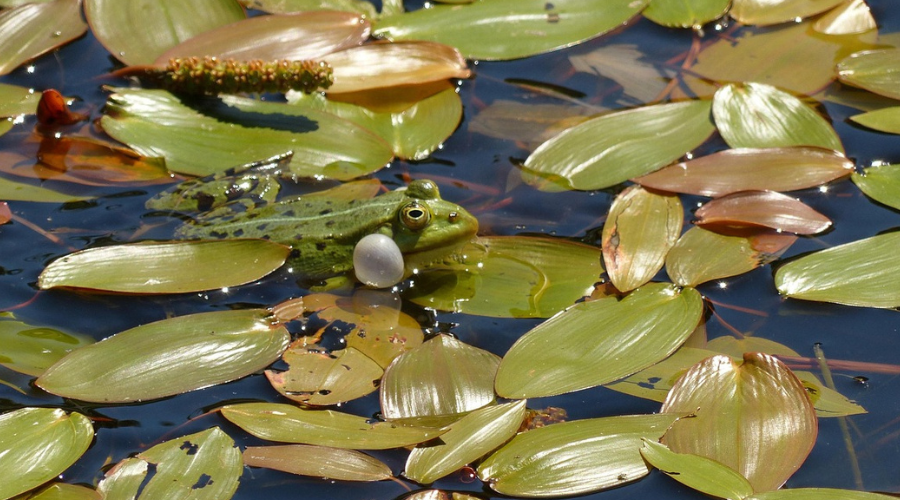
Why Brazil needs to end deforestation by 2030
1 August 2025
‘Elevator Pitch’ to the President of the EU Commission, Ursula von der Leyen, on Sufficiency
4 August 2025By Lilou BERNIER
Ponds?
You might picture frogs croaking in spring… maybe a peaceful ripple… or even that distinct earthy smell. But ponds are far more than just tiny, still waters in the countryside.
Ponds, despite their small size, make an enormous contribution to ecological stability. Ponds are small standing waters that may be permanent or temporary, man-made or naturally created. They contain up to 30% of the world’s standing water and they represent 70% of regional freshwater species pool in European landscapes, many of them rare, endemic, or threatened species.
However, the problem is significant. In Europe, estimates suggest that we have lost between 50% and 90% of ponds in the last century, mainly due to habitat destruction. Because they are small, ponds have often been assumed to be unimportant, attracting less scientific attention than larger waters. Even the IPCC reports represent the lack of information on ponds, both as ecosystems suffering from climate change and as mitigation solutions.
The main problem is that there’s currently no universally accepted legal definition of “pond”, which hinders protection efforts. We demand that scientists, legislators and policymakers work hand in hand to provide a definition and proclaim it in an international legal document.
But why is it so important? Because as already vulnerable ecosystems, ponds are among the most threatened by climate change.
Climate change is altering pond hydrology, chemistry, and species’ lifecycles due to rising temperatures and shifting seasons. Warmer air leads to warmer water and reduced water supply due to disrupted rainfall, increasing the risk of ponds drying out or disappearing altogether. Increased water temperatures can concentrate nutrients and pollutants, boosting microbial activity but also increasing toxicity. Climate change shifts species distributions, raising the risk of both invasions and extinctions, especially given the limited dispersal ability in fragmented landscapes.
But ponds are also an important mitigation tool!
Ponds serve as nature-based solutions that offer multiple benefits: carbon storage, water provisioning, flood control, groundwater recharge, pollution reduction, and recreation. Their high biogeochemical activity and capacity to regulate extreme weather events play an important role in climate mitigation. Ponds also support greater biodiversity than many larger water bodies and are more resilient to invasive species.
Their creation, restoration, and conservation are simple, versatile climate solutions!
We urge policymakers to, first, recognize a legal definition of ponds and, second, establish legal frameworks with clear responsibilities to protect ponds. We need new international standards, or even a global convention, just like we’ve done for wetlands with the Ramsar Convention. A recent proposal suggests a “Convention on the protection of ponds”, focused on their biodiversity and ecosystem services. It provides valuables suggestions that must be implemented as soon as possible, in order to hold leaders accountable regarding the protection of ponds.
Bibliography:
Biggs, J., Hoyle, Matos, I., Oertli, B., Teixeira, J. (2024). Using ponds and pondscapes as nature-based solutions. Guidance for policy makers on the use of ponds and pondscapes as nature-based solutions for climate change mitigation and adaptation, EU Horizon 2020 Ponderful project, Central University of Catalonia. https://doi.org/10.5281/zenodo.13847395
Oertli, Beat, et Kirsten M. Parris. « Review: Toward Management of Urban Ponds for Freshwater Biodiversity ». Ecosphere 10, no 7 (juillet 2019): e02810. https://doi.org/10.1002/ecs2.2810.
« Ponderful » website. https://ponderful.eu/.
Pronost, Morgane. « Le rôle des mares pour une meilleure résilience des territoires face aux changements climatiques ». Conservatoires d’espaces naturels, PRAM Normandie. (2019).
Stanković, Vera, Aleksandra Marković, Jovana Pantović, Gabor Mesaroš, et Ana Batrićević. « The Need for Unique International Legal Protection of Pond Habitats ». Aquatic Conservation: Marine and Freshwater Ecosystems 33, no 11 (novembre 2023): 1369‑86. https://doi.org/10.1002/aqc.4008.
UICN France (2018). Les Solutions fondées sur la Nature pour lutter contre les changements climatiques et réduire les risques naturels en France. Paris, France.


